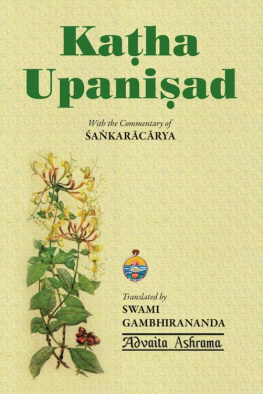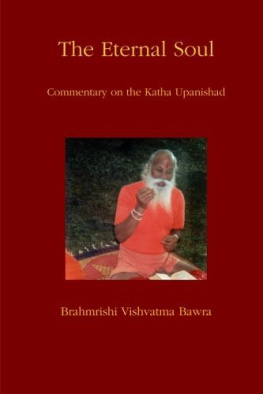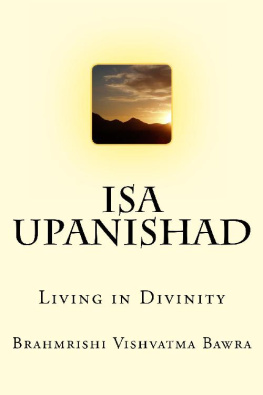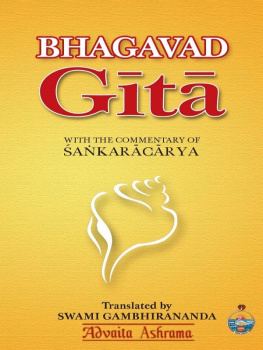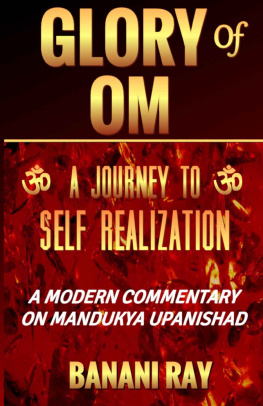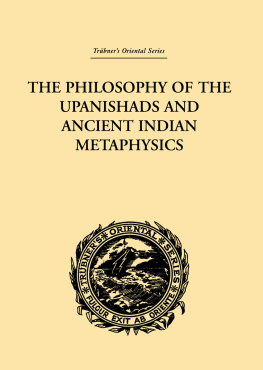KAHA UPANIAD
With the Commentary of
AKARCRYA
Translated by
Swami Gambhirananda
(P UBLICATION H OUSE OF R AMAKRISHNA M ATH )
5 D EHI E NTALLY R OAD K OLKATA 700 014
Published by
The Adhyaksha
Advaita Ashrama
P.O. Mayavati, Dt. Champawat
Uttarakhand -262524, India
from its Publication Department, Kolkata
Email: mail@advaitaashrama.org
Website: www.advaitaashrama.org
All Rights Reserved
First Print Edition, 1980
First Ebook Edition, November 2019
ISBN 978-81-85301-33-4 (Paperback)
PUBLISHERS NOTE TO
THE SECOND EDITION
We are happy to say that this second edition of the Kaha Upaniad has been thoroughly revised by the translator himself.
P UBLISHER
Mayavati
10 October 1987
PUBLISHERS NOTE TO
THE FIRST EDITION
The Kaha Upaniad is the penultimate to be published in the present series, each Upaniad being taken out in its entirety from the authors well-known Eight Upaniads in two volumes published by us. The remaining one is the Taittirya .
In the translation of the commentary, the words quoted from the text by akarcrya, are given in italics. These are followed by commas and the English equivalents. Informative explanatory footnotes have been added wherever necessary.
This Upaniad forms a part of the Brhmaa belonging to the Kaha kh of the Ka Yajur-Veda . The Kaha Upaniad stands in a class by itself. It combines charming poetry, elevating mysticism, and profound philosophy. The subject of the mystery of death is introduced through the medium of an interesting anecdote; and the teaching of the Upaniad is presented in the form of a dialogue between young Naciket, a mere boy (), who had gone to the abode of Yama, the King of Death, in search of the mystery underlying the life and death of mortals. Naciket is the student, the seeker, and Yama, the teacher, than whom there could be none better to impart the knowledge sought by the young student. In the course of the dialogue between them, there issues forth from the lips of Yama the wisdom that lies beyond life and death: an exposition of the nature of the Self, the intimate spiritual essence of our being as well as the ultimate Reality of all existence, in an unambiguous language. It also points to the limitations of logical reason and the inadequacy of mere scriptural scholarship in realizing this deepest core of the reality imbedded in the heart of every being.
Swami Vivekananda, that paramount protagonist of the Upaniads in recent times, was greatly fascinated by this Upaniad. He goes into ecstasy whenever he refers to the raddh of Naciket and of his sterling character. The Swami devotes two entire lectures in his Jna-yoga to an exposition of this Upaniad. His repeated and most popular exhortation, Arise! Awake! And stop not till the goal is reached, is based on one of the verses of this Upaniad, the latter part of which warns the seeker to be wary on his path, compared to the sharp edge of a razor ( ), which is difficult to cross and hard to tread. The Upaniad proclaims in unmistakable terms that intuitional perception of the tmn cannot be had by the unrestrained, un-meditative, and unpacified mind. Here occurs that very instructive imagery of the human body compared to a chariot, with its full complements of the master of the chariot (the soul), the charioteer (the intellect), the rein (the mind), the horses (the senses), and their roads (the sense-objects).
It is with great pleasure that we place this edition of the Kaha Upaniad in the hands of the earnest seekers after truth and lovers of spiritual knowledge.
P UBLISHER
Mayavati
10 February 1980
CONTENTS
PART I
PART II
KEY TO TRANSLITERATION
AND PRONUNCIATION
Sounds like
a
o in s o n
a in m a ster
i
i in i f
ee
in f ee l
u
u in f u ll
oo in b oo t
somewhat between
r and ri
e
a in ev a d
ai
y in m y
o
o in o ver
au
ow in n o w
k
k
kh
ckh in blo ckh ead
g
g (hard)
gh
gh in log- h ut
ng
c
ch (not k)
ch
chh in cat ch him
j
j
jh
dgeh in he dgeh og
n (somewhat)
t
h
th in an t-h ill
d
h
dh in go dh ood
n
n in u n der
t
French t
th
th in th umb
d
d in th em
dh
theh in brea the here
n
n
p
p
ph
ph in loo p-h ole
b
b
bh
bh in a bh or
m
m
y
r
r
l
l
v
v in a v ert
sh
sh in sh ow
s
s
h
h
.
m in hu m
:
half h in hu h !
LIST OF ABBREVIATIONS
.G.nanda Giri
Ai.Aitareya Upaniad
B.Brhadrayaka Upaniad
Ch.Chndogya Upaniad
Cit.Cityupaniad
G.Bhagavad Gt
Iti.Itihsa Upaniad
L. P.Liga Pura
Mu.Muaka Upaniad
R.g-Veda
ve.vetvatara Upaniad
Tai.Taittirya Upaniad
V. P.Viu Pura
KAHA UPANIAD
: : :
May He protect us both (the teacher and the taught) together (by revealing knowledge). May He protect us both (by vouchsafing the results of knowledge). May we attain vigour together. Let what we study be invigorating. May we not cavil at each other.
Om ! Peace ! Peace ! Peace !
KAHA UPANIAD
PART I
Canto I
Introduction : Salutation to Bhagavn Yama (Death), son of the Sun and the imparter of the knowledge of Brahman, and salutation to Naciket.
Now then, a brief exposition of the cantos of the Kaha Upaniad is begun for the sake of making their import easily comprehensible. The word upaniad is derived by adding upa (near) and ni (with certainty) as prefixes and kvip as a suffix to the root sad , meaning to split up (destroy), go (reach, attain), or loosen. And by the word upaniad is denoted the knowledge of the knowable entity presented in the book that is going to be explained. By virtue of what relation with (any particular) significance (of the word upaniad), again, is knowledge denoted by the word upaniad? This is being stated. Knowledge is called upaniad by virtue of its association with this significance: It (viz knowledge) splits up, injures, or destroys the seeds of worldly existence such as ignorance etc., in the case of those seekers of emancipation who, after becoming detached from the desire for the seen and unseen Thus it will be said later on, knowing That, one becomes freed from the jaws of Death (I. iii. 15). Or the knowledge of Brahman is called upaniad because of its connection with the idea of leading to Brahman, inasmuch as it makes the seekers after emancipation, who are possessed of the qualities already mentioned, attain the supreme Brahman. Thus it will be said later on, Having become free from virtue and vice, as also desire and ignorance, (he) attained Brahman (II. iii. 18). And even the knowledge about Fire, who preceded all the worlds, who was born of Brahma and is possessed of enlightenment, and whose knowledge is prayed for (by Naciket) through the second boon (I. i. 13), is also called upaniad by virtue of its bearing the meaning (to loosen) of the root ( sad ), inasmuch as by leading to the result, achievement of heaven, it weakens or loosens such multitude of miseries as living in the womb, birth, old age, etc., continually recurring in lives hereafter. Thus it will be spoken, The dwellers of heaven get immortality, etc. (ibid).
Next page
